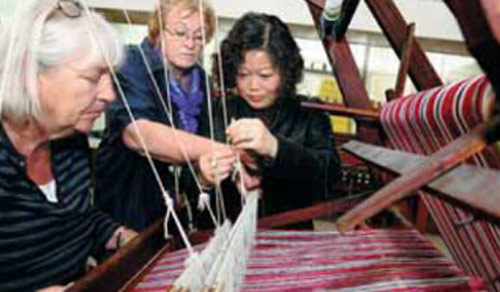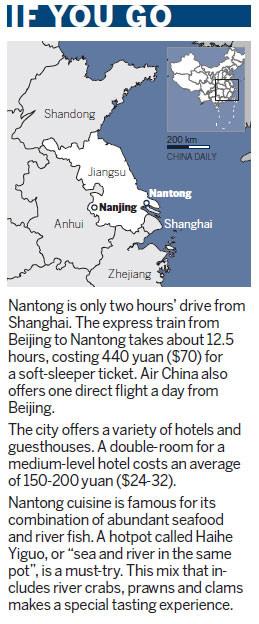
 |
|
A traditional weaving machine draws the attention of Norwegian visitors to a museum in Nantong. Xu Congjun / for China Daily |
Shen combined Western oil painting and Chinese traditional painting to create extraordinarily lifelike embroidery.
The embroidery is listed as a national intangible cultural heritage, and a sample was given as a state gift to US President Barack Obama during his visit to China in 2009.
 Indeed, the whole city is like a big museum.
Indeed, the whole city is like a big museum.
Zhang gathered people to build Nantong's modern infrastructure and many buildings still remain.
One of China's top architects, Wu Liangyong, calls Nantong "the first city of China in modern times."
After having my fill of the museums, I rode a bus for half an hour to the town of Tangzha to see a newly established creative park, which covers an area of 13.66 hectares in an abandoned industrial area.
It is rare to see such a large area of old workshop clusters built in the early 1900s.
My guess is, many artists may swarm to establish galleries and studios, turning the area into another holy land for artists like Beijing's 798 Art Zone.
For now, a slightly desolate feeling reflects the vicissitude of Zhang's utopian ambitions.
The main building was once an oil-pressing factory built in 1902; the oil seeds coming from Dah Sung's cotton, while scrap oil was used for making soap.
The broken windows have been repaired, while the mottled black-and-gray walls are still dotted with broken bulbs.
I wondered if the designer kept it that way on purpose for the nostalgic flavor.
"It is a living fossil of industry," says Zhu Jin, Nantong's deputy mayor. "However we expect it to be a new space for creativity to embrace the future."
Contact the writer at wangkaihao@chinadaily.com.cn.
Ding Congrong contributed to this story.